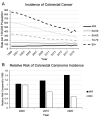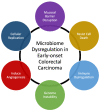The Impact of the Gut Microbiome, Environment, and Diet in Early-Onset Colorectal Cancer Development
- PMID: 38339427
- PMCID: PMC10854951
- DOI: 10.3390/cancers16030676
The Impact of the Gut Microbiome, Environment, and Diet in Early-Onset Colorectal Cancer Development
Abstract
Traditionally considered a disease common in the older population, colorectal cancer is increasing in incidence among younger demographics. Evidence suggests that populational- and generational-level shifts in the composition of the human gut microbiome may be tied to the recent trends in gastrointestinal carcinogenesis. This review provides an overview of current research and putative mechanisms behind the rising incidence of colorectal cancer in the younger population, with insight into future interventions that may prevent or reverse the rate of early-onset colorectal carcinoma.
Keywords: EOCRC; adenocarcinoma; birth-cohort effect; clinical translation; diet; early-onset colorectal cancer; environmental exposures; gut microbiome; inflammation; risk factors; young onset.
Conflict of interest statement
The authors declare no conflicts of interest.
Figures


References
-
- Cercek A., Chatila W.K., Yaeger R., Walch H., Fernandes G.D.S., Krishnan A., Palmaira L., Maio A., Kemel Y., Srinivasan P., et al. A Comprehensive Comparison of Early-Onset and Average-Onset Colorectal Cancers. JNCI J. Natl. Cancer Inst. 2021;113:1683–1692. doi: 10.1093/jnci/djab124. - DOI - PMC - PubMed
Publication types
LinkOut - more resources
Full Text Sources

